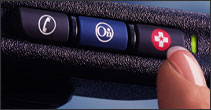Anyone who listens to ESPN Radio knows these ads, since the GM-owned subscription-based communications, monitoring, and tracking service is a big sponsor of the sports programming. How often have we heard ESPN standard-bearer Dan Patrick (below, right)—a guy making thousands and thousands of dollars from extracurricular commercial spokesmanship—say that his intervew with say, Joe Montana, was coming "courtesy of the OnStar Hotline"?
 The way things are going, without OnStar we won't be able to hear any more ESPN Radio interviews, so ubiquitous is its presence on the ESPN airwaves. Well, I'm glad ESPN has found itself a reliable sugar-daddy; meanwhile, you can bet that ESPN sales execs must be laughing themselves to sleep at night. Because, let's face it, when you really think about it, OnStar is one of the dumbest ideas foisted on the ultra-security-minded, maybe even paranoid, American car-driving public. But if GM wants to pay ESPN tons of money to continuously get the word out, why should the sports network care about the folly of the product?
The way things are going, without OnStar we won't be able to hear any more ESPN Radio interviews, so ubiquitous is its presence on the ESPN airwaves. Well, I'm glad ESPN has found itself a reliable sugar-daddy; meanwhile, you can bet that ESPN sales execs must be laughing themselves to sleep at night. Because, let's face it, when you really think about it, OnStar is one of the dumbest ideas foisted on the ultra-security-minded, maybe even paranoid, American car-driving public. But if GM wants to pay ESPN tons of money to continuously get the word out, why should the sports network care about the folly of the product? Meanwhile, GM recently announced 30,000 new job cuts which will affect employees at manufacturing plants all over the country. GM is going through difficult times, but, by God, OnStar gets full-blown promotion, probably because scaring people might be a better sales tactic than building affordable, reliable, stylishly designed, fuel-efficient cars.
 As of 2005, OnStar is a standard feature for many GM vehicles, and it reportedly will be standard on all new GM vehicles sold in North America by 2007. GM also sells the system to other auto manufacturers, while competitors like Ford have been developing their own versions. Through its factory-installed hardware, OnStar enhances communication capabilities for drivers by uniting mobile phone networks with tracking by GPS (global-positioning) technology. Drivers use an audio interface to contact OnStar representatives for what has been described as "concierge-like" roadside services. (Listen to the ads for an example of OnStar's caretaker role.) The reps can further initiate contact with the driver when vehicle telemetry indicates an emergency, such as might be indicated by airbag deployment.
As of 2005, OnStar is a standard feature for many GM vehicles, and it reportedly will be standard on all new GM vehicles sold in North America by 2007. GM also sells the system to other auto manufacturers, while competitors like Ford have been developing their own versions. Through its factory-installed hardware, OnStar enhances communication capabilities for drivers by uniting mobile phone networks with tracking by GPS (global-positioning) technology. Drivers use an audio interface to contact OnStar representatives for what has been described as "concierge-like" roadside services. (Listen to the ads for an example of OnStar's caretaker role.) The reps can further initiate contact with the driver when vehicle telemetry indicates an emergency, such as might be indicated by airbag deployment.OnStar, originally developed by an IBM internship team, is being touted as an essential New Age safety tool. It affords the potential for aiding police in tracking down stolen vehicles (remember LoJack?), for making swift contact with emergency medical services, for notifying drivers of potentially dangerous mechanical problems, and to unlock doors for drivers who've misplaced their keys or locked them inside the car.
Supposedly, OnStar is in about 3 million cars, and supposedly several thousand more are being installed every day. The cost ranges from about $200-$800 per year, paid on a monthly basis not unlike your Internet service provider bill. Plus, at least before it becomes the standard in every GM car, you have to pay separately for its installation.
Now a lot of questions have been raised about the OnStar technology, most pertinently about where it fits into our modern age of security and surveillance and access to information. The privacy implications of OnStar are palpable. Can police or others make use of OnStar’s tracking for surveillance, or even for stalking? Does OnStar have the potential to provide evidence that can be used in court, against the driver’s wishes, in cases of auto accidents? And what about data collected by the OnStar "event-data" recorder—can insurance companies or auto dealers use that information to possibly cite reckless driving (or something else) as the basis for denying claims or warranty service?
So besides its awful, fear-based advertising campaign, and its promotion in an era when GM is laying-off workers who actually build the cars, OnStar also raises issues of its becoming some kind of tacky “Big Brother” watchdog. (Oh, and lest we forget, the last time I checked, the so-called fuzz-buster is illegal; God forbid that individuals have any knowledge of the whereabouts of the police.) One wonders what George Orwell would have said if you told him, "Oh yeah, there's a system in your vehicle that tracks your every move, your every destination, the speed at which you traveled to arrive at said destination, and whether you happened to have an incident of any kind involving another motorist." It's enough to make 1984 look like the "good ol' days."
Based on the law of averages involving highway breakdowns, car accidents and severity of car accidents, and the odds that a driver will be completely incapacitated by said incidents, what is it that OnStar does for anybody on a cost-effective basis that is any different than what might be achieved with a cell phone (which almost everyone has nowadays) combined with a low-cost membership in AAA?
So let's see, I'm in a fender-bender and my air bag is deployed. I'm conscious and I reach for my cell phone and I call 911. Alternatively, I'm in a hellacious accident and I'm unconscious, whereby I can't call anybody, but odds are that another motorist passing by will see the event and phone the police themselves. People still do that, don't they?
Now, as to OnStar's probably most practical service—unlocking car doors—are you gonna pay up to $70 a month for that?? Or maybe you'll keep your wits about you a little better where your car keys are concerned, or maybe even carry a spare on your person always to avoid something like that ever happening again. Or maybe you can use your cell phone to call your spouse who has a spare key. And yes—gasp!—you might have to call a locksmith. If you're lucky, you might run into an enterprising individual who knows how to creatively get into your car. All are a lot cheaper than what OnStar costs over the course of a year.
The OnStar campaign is very strange indeed. It provides insight into the eerie confluence where human insecurity, human disconnectedness and the fear of aloneness in a cold modern world meet high-tech developments designed to sell us peace of mind. As if anyone can purchase that.
The sad news is that maybe someday you won't be able to purchase a new car that doesn't have an OnStar-type device. In which case, you might want to hold on to that old beater for as long as you can. Better still, maybe people will realize what an unnecessary crock OnStar is, refuse to purchase it, then refuse to purchase GM cars in general come 2007 (thus rendering the auto giant irrelevant and causing massive unemployment), whereupon OnStar can go the way of the Chinese wok or the Tupperware party: a quaint little passing fad whose time came and went because common sense prevailed over it.
Meanwhile, ESPN coffers swell—and we get to hear Dan Patrick converse amicably with John Riggins—while GM employees in Spring Hill, Tennessee, and elsewhere will be looking for new work very soon. If they can find it.
"Way to go, OnStar."
No comments:
Post a Comment